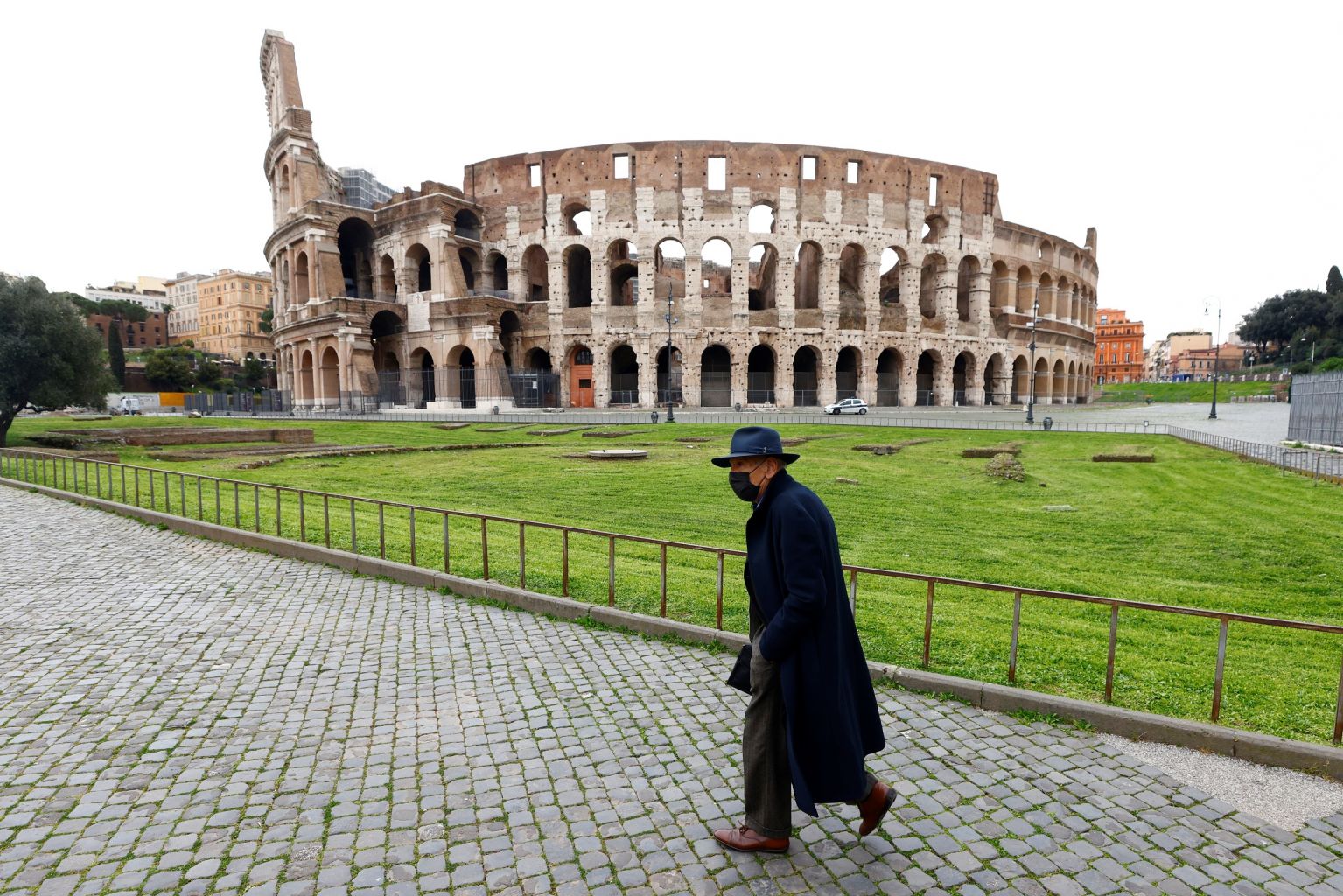Italy hopes AstraZeneca 'mess' won't sink Covid-19 vaccine plan
Sign up now: Get ST's newsletters delivered to your inbox

A man walks near the Colosseum on the second day of lockdown in Rome, Italy, March 16, 2021.
PHOTO: REUTERS
ROME (AFP) - Most of Italy is back in lockdown, but the new government hopes its coronavirus vaccine plan will make this one the last - as long as concerns over AstraZeneca's safety do not derail things.
Prime Minister Mario Draghi unveiled at the weekend a new vaccination strategy that aims to massively speed up inoculations to cover 80 per cent of the population by September.
However, trouble with the AstraZeneca/Oxford vaccine - temporarily suspended across much of the EU due to fears over possible blood clotting side effects - risks upending the plan before it really gets going.
"It is a big mess, there is no point denying it," Giorgio Mule, a junior defence minister, told Il Messaggero newspaper.
Draghi's plan counts on Italy receiving 16 million vaccine shots by the end of the month, rising to 52 million during the second quarter of the year, and 85 million in the third quarter.
But a large number of doses are supposed to come from AstraZeneca: 2.9 million in the next couple of weeks, 10 million in the second quarter and 25 million in the third quarter.
The European Medical Agency (EMA) said on Tuesday (March 16) it remained "firmly convinced" that the benefits of the Anglo-Swedish vaccine "outweigh the risk" of side effects.
Hours later, Draghi and French President Emmanuel Macron said their countries would "promptly restart the administration" of the vaccine if it is cleared by the EU regulator - a decision expected on Thursday.
For Italy, the suspension means around 200,000 fewer vaccinations this week, government sources said, expressing confidence that they could make up for the setback.
500,000-a-day target
Italy badly needs relief from a pandemic that started 13 months ago, claiming more than 102,000 lives in the country so far and triggering a recession which has put almost 500,000 people out of a job.
A fresh wave of infections of Covid-19 sent much of the country back into lockdown on Monday, with schools, bars, restaurants and shops closed and residents urged to stay home for three weeks.
Draghi, a former president of the European Central Bank who took over at the head of a national unity government last month, has set a target of nearly tripling the number of daily vaccine injections to 500,000 per day.
This should lead to 60 per cent of the population getting fully vaccinated by late July, rising to 70 per cent in late August and 80 per cent in mid-September, according to the strategy plan.
Only around two million Italians have so far received the necessary two vaccine shots, out of a population of about 60 million.
"We have to speed up!" the government's new pandemic commissioner, General Francesco Paolo Figliuolo, said on RAI public television on Sunday.
Vaccinating lawyers
Like other EU countries, Italy's vaccination programme has been dogged by delays in supplies of jabs - but experts say these are not entirely to blame for the slow progress.
Carlo Palermo, head of doctors' trade union Anaoo Assomed, said Italy had a good start in January when it focused on health workers and care homes, but then struggled to scale up.
This was partly due to personnel shortages, with a drive to recruit some 12,000 extra nurses as vaccinators eliciting only around 4,000 applications, he told AFP.
There was also poor coordination between regions on prioritisation. Tuscany, for example, focused on vaccinating lawyers, so many healthy people in their 30s and 40s have got the shots.
Across Italy, only a third of the 6.85 million vaccine doses administered so far have gone to people aged 70 or above, despite their increased vulnerability to coronavirus.
"The extent to which vaccines have so far been administered to relatively young categories is quite surprising... and cannot be explained on health grounds," Federico Santi, senior analyst at Eurasia Group, told AFP.
Deploying more help
The government is now recruiting the help of pharmacists, trainee doctors, dentists and family doctors to administer the jabs, and will bring in the army and civil protection agency to help struggling regions like Calabria in the south.
It is expanding vaccine facilities, opening large-scale hubs and repurposing car parks, shopping centres, gyms, factories and even church property - although one centre in Rome's Termini station shut Tuesday due a shortage of AstraZeneca jabs.
But even if the AstraZeneca vaccine is cleared by the European Medicines Agency and its use can resume, there are fears it will fuel the already relatively strong anti-vaxxer sentiment in Italy.
There may also be more supply shortages, Santi said, noting that Johnson & Johnson and AstraZeneca are among the pharma companies struggling with production delays.
"Supplies remain the big question mark," he said.


